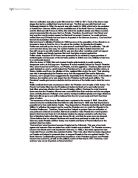But, as many at the time didn’t realise, the Zollverein was playing a significant part in unifying Germany. Prussia itself did not have enough influence over the Zollverein to unite the states and many of the states in question sided with Austria in the war of 1866, as opposed to following the idea of a Kleindeutsch, (a Germany without Austria). But after the employment of Manteuffel in the 1850’s Prussia had then the strength to see off Austria and so the idea of it was ‘coal and iron’ that created unification as opposed to Bismarck’s ‘blood and iron’.
In 1862, Bismarck made a speech which appeared to offer the liberals the prospect of a united Germany if they resisted pressing further control over the Landtag. But due to a lack of distrust, the liberals refused to accept this as true, and continued to view Bismarck as an anti-liberal reactionary, with no hope of uniting Germany. This view was increased in 1864 when the Schleswig-Holstein question came into play. The Danes wanted to incorporate Schleswig-Holstein into their Danish Empire, which was gravely opposed by German Nationalists who turned to the German Confederation to stop this taking place. Bismarck however stepped in, ignoring both the Confederation and the nationalists, and joined with Austria to fight for Schleswig to be annexed to Prussia and for Austria to gain Holstein. The nationalists were angered by this as they felt that Prussia had acted in her own self interest as opposed to unification. But this can be argued that Bismarck was in fact acting on the Kleindeutsch’s interest by removing Austrian influence in Northern Germany when Prussia later pushed on to try and gain Holstein from Austria, which led to war. In an attempt to gain support, Bismarck once again called upon the nationalists for support, which again fell on deaf ears. Bismarck managed to win the war against Austria which caused a sudden turn about in the nationalist attitude towards him.
“Many German nationalists now recognised that there was, with Austria excluded from Germany, in terms of nationalism, if not liberalism, no irreconcilable differences between Bismarck’s Prussian policy and Kleindeutsch German nationalism.”
Bismarck has successfully managed to entwine the nationalist movement with the expansionist policy of Prussia, but needed to carry on both causes in order to gain continuing support. Bismarck realised that he would to act on the issue of the southern states in order to strengthen Prussia’s power and also unite Germany. There was already a slight pressure from some of the southern states, mainly those threatened by France, for unification with the north but this was countered by the elections of the Zollparlament (parliament to discuss the Zollverein), of 1868. Bismarck stated that;
“That German unity would be furthered by violent events I also hold probable.” And “That German unity is not at this moment a ripe fruit.”
These quotations taken from his speech show that Bismarck was more than willing to wait for the right moment and that is violence was needed then so be it. Perhaps Bismarck feared the joining with states so different to that of Prussia, e.g. full of Catholics and more liberal minded people who for many years had been anti-Prussia.
By 1970, nationalist liberals in the North were growing impatient with Bismarck as he had made no significant changes to encourage unification and meanwhile the support for unification in the south was growing thin. Bismarck saw the opportunity for unification with the vacancy of the Spanish throne. Bismarck decided that this would cause him a win or lose situation. If Prussia could put their candidate on the Spanish throne, this would increase Prussia’s prestige, even if it risked war with France and if it did cause war with France then Bismarck could unite the country against France. Prussia did not get to put their candidate on the throne due to interference from France, and it didn’t cause the war that Bismarck had hoped for until France started making demands on the Prussian King, which he refused. This gave Bismarck the chance he needed to provoke Prussia. Bismarck managed to provoke France to declare war through exploitation of a meeting between the King of Prussia and the French Ambassador. This drove German nationalists into an anti-French frenzy and encouraged the romantic ideals of 1848 to reappear. Germany won the war which again, encouraged by Bismarck, sent the country into a patriotic fervour which was also encouraged by nationalist media. Unification seemed certain. Bismarck later negotiated with the Southern states who reluctantly agreed to let Prussia dominate Germany, but still give recognition to the Southern monarchies.
Bismarck has no choice but to take nationalism into account when dealing with the unification of Germany and hence the German Empire was in consistency with the ideas of nationalists even though the constitution wasn’t a liberal as some of the nationalists would have liked.
“A German Empire emerged in 1871 and not simply a Greater Prussia; it was a sense of Germanness that gave it its identity. Nationalism gave Bismarck’s ambitions for Prussia a sense of moral legitimacy.”







